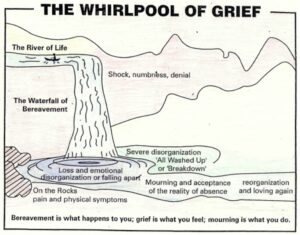What Is Grief?
Grief is the intensely personal emotional, cognitive, behavioural, and physical response to a loss, most commonly the death of someone dear, but it can also follow divorce, job loss, or other significant life changes. It is more than sadness as it can encompass anxiety, shock, guilt, even relief, interwoven in unpredictable ways (American Psychological Association, 2025).
A World That Does Not Pause
After a profound loss, many say it feels as though the world should stop turning, however life keeps going. Meals still need to be prepared, work goes on, seasons change, and anniversaries arrive. This disconnect often deepens the sense of loneliness for an individual who has experienced a great loss, as though everyone else is living in a reality the bereaved individual no longer shares with the world. This dissonance, deeply human and valid, marks the opening chapter of grief.
Grief Is Complicated
Grief is not a checklist you complete and remove. While various models describe stages, grief does not unfold linear or predictably, since individuals revisit emotions repeatedly in an undetermined manner (Avis, Stroebe & Schut, 2021). Each person’s journey is unique. Some individuals have shared that it takes up to four years to complete the stages of grief. One should therefore not attempt to force your process into predefined stages or hasten the process, as this can cause even more distress. Kübler‑Ross’s well‑known model outlines five emotional phases known as denial, anger, bargaining, depression, and acceptance (Kubler‑Ross & Kessler, 2005). While widely recognized, research highlights that individuals rarely experience grief sequentially and often alternate between stages.
1. Denial
“This can’t be happening” is often the protective shield at the beginning of the grieving process. Commonly characterized by numbness and shock, denial allows emotional processing to begin at a manageable pace.
2. Anger
During this phase frustration surfaces which is directed at various targets, such as oneself, others, fate, or even the deceased. It signifies movement through numbness toward processing loss, but this may also bring about guilt or confusion.
3. Bargaining
Here the mental struggle begins with “If only I’d…,” or “What if I had…” It reflects attempts to regain control in an unpredictable world. During this process, please remember that this is not weakness, it is the mind trying to negotiate meaning.
4. Depression
This is not clinical depression necessarily, but an appropriate grief response of deep sadness, withdrawal, changes in appetite or sleep, or loss of energy, as the reality of loss settles.
5. Acceptance
Acceptance is not happiness or indifference, but a different sense of living with the loss. Acceptance involves seeing life continue, cherishing memories, and gradually rebuilding routines.
The Whirlpool of Grief

Grief is often described through Dr Richard Wilson’s metaphor a “Whirlpool of Grief”, as a vivid illustration of the emotional turbulence following a loss. Imagine life as a gently flowing river; then suddenly you are swept over the “Waterfall of Bereavement” into the chaos of a whirlpool, where feelings of anger, guilt, anxiety, heartbreak, and disorientation swirl uncontrollably. These intense emotional undercurrents can drag you down, then unexpectedly spin you back up, making each day feel unpredictable and overwhelming. Eventually, with time, support, and self-compassion, many find themselves drifting back into calmer waters, gradually re-establishing routines while still carrying the memory of their loss. Understanding grief as a whirling non-linear force, can help normalize the experience and provide hope that peace may return, even after recurring waves of pain.
Be Aware of Significant Dates
While grief never fully vanishes, certain dates may sharpen its edge:
- First birthdays without a your loved one.
- First holidays without the loved one can feel empty or triggering.
- Death anniversaries and special occasions such as weddings, graduations, or family reunions, often bring fresh waves of emotion.
- Milestones the loved one never reached e.g. child’s 10th birthday, a teenager’s matric farewell or retirement, might spark unexpected sorrow.
Anticipating these dates can help in preparing through supportive conversations, rituals, reaching out to others who understand, or honouring memories in meaningful yet manageable ways.
Warning Signs: When to Consider Professional Support
Grief is natural, but intense or prolonged symptoms merit discussion with a healthcare professional:
- Persistent physical symptoms like sleep loss, appetite changes, fatigue, stomach pain
- Intrusive or overwhelming distress, unable to function in daily life, thus the inability to function at work, sleep, eat, or maintain relationships
- Prolonged grief disorder is a persistent longing for the deceased, inability to accept death, or emotional numbness, lasting beyond 6–12 months
- Expressing thoughts of harming yourself or intense hopelessness
- Difficulty caring for yourself or others; decline in hygiene or work performance
- Substance misuse or self‑destructive behaviours to cope
- Feelings of being “stuck” or unable to live in the present
These signs may indicate complicated or prolonged grief, a condition recognised in DSM‑5 (Akgül, Rieger & Boelen, 2022).
Helpful Approaches Along the Way
- Allow emotions: Retreat from judgment and allow anger, confusion and peace to surface.
- Reach out: One meaningful connection often matters more than routine interactions. You are not an island and do not have to go through this alone.
- Rituals matter: Writing letters, lighting candles, planting trees, and having personal ceremonies can foster meaning.
- Honour your timeline: Grief does not end as your relationship with loss evolves.
- Move gently: Balancing self‑care (rest, nutrition, fresh air, exercise) with pausing for grief allows healing synergy.
Grief is deeply personal and messy. You may feel your world stop, but life continues, and that does not mean the intensity of your experience is less valid. There is no programme to follow as each person’s story is unique, whether you revisit denial or find acceptance early, your path is yours. Be kind to yourself, as this is a process.
The Author: Racheal Johnston (Social Worker specialising in Play Therapy)

More about Racheal Johnston: https://www.vitanova.co.za/meet-the-team/racheal-johnston/
To schedule a session with the author or any of our counsellors at Vita Nova, please contact us on 0712979992, or go to www.vitanova.co.za. We offer a range of counselling services and have interns that can provide you with assistance for free if you are not in a position to afford therapy.
For 24 hr assistance on mental health matters contact SADAG on 0800 567 567
Help is always available.
References
- Akgül, S., Rieger, I. and Boelen, P.A., 2022. Prolonged Grief Disorder, DSM‑5‑TR.
- Avis, K.A., Stroebe, M. & Schut, H., 2021. “Stages of Grief Portrayed on the Internet: A Systematic Analysis and Critical Appraisal,” Frontiers in Psychology.
- Kubler‑Ross, E. & Kessler, D., 2005. On Grief and Grieving: Finding the Meaning of Grief Through the Five Stages of Loss. Scribner.
- O’Connor, M.F., 2019. “Grief: A Brief History of Research on How Body, Mind, and Brain Adapt,” Psychosomatic Medicine.
- Stroebe, M., Schut, H. & Boerner, K., 2017. “Continuing Bonds vs. Stage Theory,” Death Studies.
- [APA] American Psychological Association, 2025. “Grief,” APA Topics.


